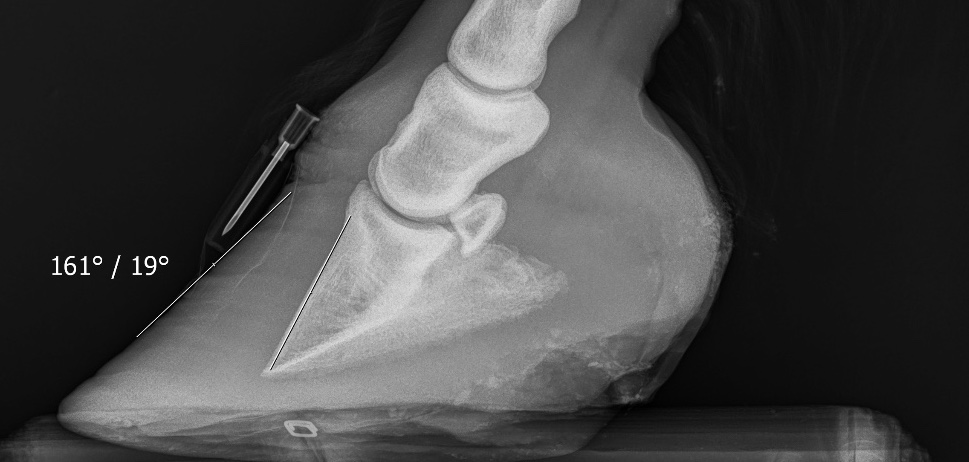Laminitis- Free ACTH testing is back!
Anyone who has seen a horse with laminitis will agree that it can be a debilitating and extremely painful condition. Laminitis is essentially inflammation within the "laminae" of the horses hoofs; structures which attach the pedal bone in the foot to hoof capsule itself. Mild stages of this condition make standing and walking painful for the horse while more severe or chronic cases can result in separation or detachment of the hoof wall from the bone within leading to permanent and devastating consequences.
Access to lush grass has been recognised as a trigger for development of laminitis for many years with overweight horses and ponies being at a higher risk. We now know however, that up to 90% of laminitis cases can have an underlying hormonal disorder in the form of either EMS (Equine Metabolic Syndrome) or PPID (Pars Pituitary Intermedia Disorder) better known as Equine Cushings Disease. Additionally, a small percentage of laminitis cases are caused by severe illness or toxic shock, such as seen in mares which fail to pass their placenta after foaling.
PPID or Equine Cushings disease is caused by a hormonal imbalance in the hypothalamic and pituitary glands of the brain resulting in excessive circulating quantities of ACTH and Cortisol hormones. It typically occurs in older horses and ponies however we are now identifying it in horses as young as 10 years. Horses with PPID can exhibit any of the following clinical signs:
Access to lush grass has been recognised as a trigger for development of laminitis for many years with overweight horses and ponies being at a higher risk. We now know however, that up to 90% of laminitis cases can have an underlying hormonal disorder in the form of either EMS (Equine Metabolic Syndrome) or PPID (Pars Pituitary Intermedia Disorder) better known as Equine Cushings Disease. Additionally, a small percentage of laminitis cases are caused by severe illness or toxic shock, such as seen in mares which fail to pass their placenta after foaling.
PPID or Equine Cushings disease is caused by a hormonal imbalance in the hypothalamic and pituitary glands of the brain resulting in excessive circulating quantities of ACTH and Cortisol hormones. It typically occurs in older horses and ponies however we are now identifying it in horses as young as 10 years. Horses with PPID can exhibit any of the following clinical signs:
- Laminitis (may be the only sign observed)
- Long curly hair coat or delayed shedding of winter coat
- Abnormal sweating
- Abnormal fat distribution
- Change in appetite
- Increased drinking/urination
- Lethargy/ poor performance
- Recurrent infections
- Loss of muscle/ potbelly appearance
Testing is very simple and involves a blood test measuring the hormone ACTH. The good news is that the lab fee for this test is FREE for the next few months so it is an excellent time to test any horses which might be showing suspicious signs. It is recommended that any horse over 10 years of age with laminitis be tested.
The other major hormonal cause of laminitis is EMS which affects the horses metabolism in a similar way to Type II diabetes in people. Affected horses are unable to regulate insulin normally and therefore cannot cope with high levels of starch/sugars in the diet. Ponies, native breeds and overweight horses are most commonly affected. A diagnosis can often be made by clinical signs but blood tests are also available to aid in detection. There is no cure as such, however the condition can be managed by dietary and exercise modifications. It is common for horses with PPID to also suffer from EMS concurrently, the two conditions therefore go hand-in-hand.
Correct diagnosis and management of underlying triggers for laminitis is key in achieving a successful outcome. For more advice on managing horses or ponies with laminitis, feel free to contact our vets. If you would like to avail of the free PPID (ACTH) blood test, contact the office or consult www.talkaboutlaminitis.ie for more information.
The other major hormonal cause of laminitis is EMS which affects the horses metabolism in a similar way to Type II diabetes in people. Affected horses are unable to regulate insulin normally and therefore cannot cope with high levels of starch/sugars in the diet. Ponies, native breeds and overweight horses are most commonly affected. A diagnosis can often be made by clinical signs but blood tests are also available to aid in detection. There is no cure as such, however the condition can be managed by dietary and exercise modifications. It is common for horses with PPID to also suffer from EMS concurrently, the two conditions therefore go hand-in-hand.
Correct diagnosis and management of underlying triggers for laminitis is key in achieving a successful outcome. For more advice on managing horses or ponies with laminitis, feel free to contact our vets. If you would like to avail of the free PPID (ACTH) blood test, contact the office or consult www.talkaboutlaminitis.ie for more information.

